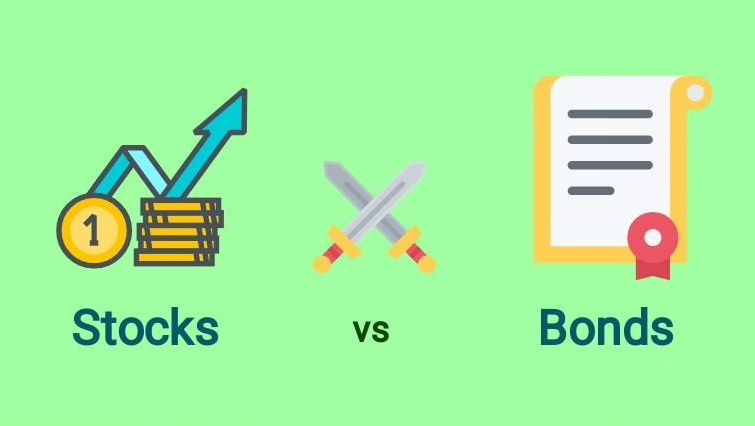When diving into the world of investing, the age-old debate of stocks vs bonds is often one of the first decisions a beginner faces. Like choosing between a fast-paced sports car and a reliable family vehicle, each has its own appeal, risks and rewards.
To make informed choices, it's essential to understand the role both assets play and how they interact within a diversified portfolio.
What Are Stocks?

Stocks represent ownership in a company. When you purchase shares, you're essentially buying a stake in that business. This ownership gives you the right to a portion of the company's profits and, in some cases, voting rights in shareholder meetings. Your return from stocks comes from capital appreciation, when the share price increases, and dividends, which are regular payments some companies issue to shareholders.
However, stocks come with volatility. Prices can fluctuate wildly based on economic conditions, company performance, and investor sentiment. While this adds a layer of risk, it also opens the door to higher long-term gains. Historically, stocks have outperformed other major asset classes over long periods, which makes them attractive for growth-focused investors.
What Are Bonds?
Bonds, in contrast, are a form of debt investment. When you buy a bond, you are lending money to a government, municipality, or corporation. In return, you receive interest payments over a specified period and are repaid the face value when the bond matures. Bonds are typically less volatile than stocks and are considered a safer investment, especially in uncertain market conditions.
The appeal of bonds lies in their stability and predictable income. Investors who seek preservation of capital or a steady income stream often turn to bonds, especially those issued by reputable governments or high-quality corporations.
Understanding the Key Differences
The fundamental difference in stocks vs bonds comes down to ownership versus lending. When you own stocks, you become a partial owner of the company. When you invest in bonds, you are a creditor. Stocks offer the potential for higher returns, but with higher risk. Bonds tend to be more stable, offering lower but more predictable returns.
Stocks are generally better suited for long-term growth strategies. They perform well when economies grow and corporate profits rise. Bonds, on the other hand, are more defensive. They help to protect your portfolio when markets decline or when interest rates fall.
When Should You Choose Stocks?
Investors typically favour stocks when they have a longer investment horizon and a higher risk tolerance. Stocks can deliver significant growth, especially if you're willing to ride out the ups and downs of the market. They're particularly appealing during economic booms or bull markets when company earnings are on the rise.
Younger investors or those saving for long-term goals like retirement may prefer stocks as they have time to recover from short-term losses. However, it's important to diversify across different industries and geographies to reduce risk.
When Should You Choose Bonds?
Bonds become more attractive when investors want to minimise risk or generate steady income. They are often favoured by older investors or those approaching retirement, as they help to preserve capital and reduce exposure to market volatility.
Government bonds are generally considered the safest, especially those issued by developed nations. Corporate bonds offer higher yields but come with varying levels of risk depending on the issuer's creditworthiness. Choosing the right bond depends on your financial goals and risk appetite.
Stocks vs Bonds in a Diversified Portfolio

One of the smartest ways to invest is to include both stocks and bonds in your portfolio. This approach helps you balance risk and return, smoothing out the impact of market swings. Stocks provide the growth potential, while bonds offer stability.
The ratio of stocks vs bonds in your portfolio should reflect your financial goals, time horizon and risk tolerance. For example, a young professional may opt for 80 percent in stocks and 20 percent in bonds. Conversely, a retiree might reverse that allocation to preserve wealth and draw steady income.
Asset allocation strategies often change over time. As you approach key life milestones, shifting more into bonds can help reduce risk and protect the wealth you've accumulated.
What Happens During Market Volatility?
During periods of economic uncertainty, bonds tend to perform better than stocks. Investors typically flee to safer assets, pushing up bond prices and lowering yields. In contrast, stock prices can fall quickly in response to negative news or sentiment.
This dynamic highlights the importance of owning both asset types. Stocks may decline in the short term but often recover strongly. Bonds help cushion the blow during downturns, keeping your overall portfolio more stable.
Tax Implications to Consider
Tax treatment varies between stocks and bonds. Dividends from stocks may be taxed at different rates depending on your country's tax rules. Capital gains taxes apply when you sell stocks for a profit. Bonds also have tax implications, especially if you receive interest payments. Some government bonds may be exempt from certain taxes, making them attractive to investors in higher tax brackets.
Understanding how your investments are taxed is crucial for overall financial planning. Be sure to consult a financial advisor or tax professional to optimise your strategy.
Conclusion
The debate of stocks vs bonds isn't about which is better overall, but which is better for you. Your ideal investment mix depends on your personal goals, comfort with risk and investment timeline.
For most people, a blend of both is the smartest route. Stocks provide growth and the opportunity to build wealth, while bonds deliver consistency and reduce the impact of market turmoil. By learning how each works and adjusting your strategy as your needs evolve, you can build a more resilient portfolio that supports you through every stage of life.
Disclaimer: This material is for general information purposes only and is not intended as (and should not be considered to be) financial, investment or other advice on which reliance should be placed. No opinion given in the material constitutes a recommendation by EBC or the author that any particular investment, security, transaction or investment strategy is suitable for any specific person.








